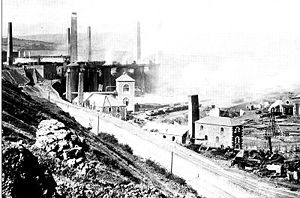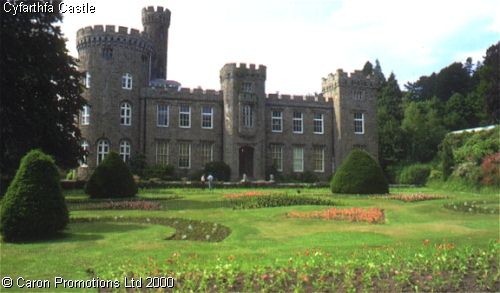The Crawshay Family
Just before the death of Anthony Bacon, there came from London one Richard Crawshay, a Yorkshire man, who was destined to play a big part in the development of the industrial wealth of Merthyr Tydfil. Reports of the mineral wealth of South Wales reached him and he decided to come to Merthyr Tydfil. He leased the Cyfartha Works from Bacon's family in 1786 and, by 1794 had become sole owner. In a short space of time he had become so wealthy that he could afford to lend his Brecon banker £50,000, and to promise another £50,000 if it were required.

He made his mind to produce iron of the best quality so he visited Henry Cort, at Gosport, near Portsmouth. Cort had, in 1784, invented the process known as rolling and puddling. The latter was a method of converting pig iron into malleable iron. Crawshay adopted this process and with great success. It became known as the "Welsh process". In 1803, he was employing 1,500 men in what was then considered to be the largest works in the world. Another visitor who came to Merthyr Tydfil was Robert Raikes, the founder of Sunday Schools. At the special request of Richard Crawshay he came to study the conditions under which the people lived. As a result of this visit, the first Sunday School was established at Cyfartha.
Richard Crawshay died in 1810. Although the works passed down to his son William Crawshay, he was deeply immersed in his work as an Indian merchant and had no time  for the Cyfartha works. He in turn appointed his son also William Crawshay to manage the concern. A few years later with the construction of the railways, the works output rose to deal with the large orders for rails. In 1825 Cyfartha Castle was built at a cost of ?30,000. In 1847, William Crawshay retired and was succeeded by his son, Robert Crawshay and the works continued to flourish. During his time at Cyfartha steel began to supersede iron, but he was unwilling to take up its manufacture. This resulted in fewer orders at Cyfartha. To make up for this loss of trade, Robert Crawshay turned his attention to the coal deposits on the estate and these proved very profitable. He was the last of the Crawshay to reside at Cyfartha. His sons appointed managers to look after the works interests, and in 1902 the works were acquired by Messrs. Guest, Keen and Nettlefolds. The busy days of the Cyfartha Works were over and they were closed down in 1910. In 1915 it was?reopened?to produce pig iron and shell steel during the Great War. It finally closed forever in 1919. Dismantling was commenced in 1928.
for the Cyfartha works. He in turn appointed his son also William Crawshay to manage the concern. A few years later with the construction of the railways, the works output rose to deal with the large orders for rails. In 1825 Cyfartha Castle was built at a cost of ?30,000. In 1847, William Crawshay retired and was succeeded by his son, Robert Crawshay and the works continued to flourish. During his time at Cyfartha steel began to supersede iron, but he was unwilling to take up its manufacture. This resulted in fewer orders at Cyfartha. To make up for this loss of trade, Robert Crawshay turned his attention to the coal deposits on the estate and these proved very profitable. He was the last of the Crawshay to reside at Cyfartha. His sons appointed managers to look after the works interests, and in 1902 the works were acquired by Messrs. Guest, Keen and Nettlefolds. The busy days of the Cyfartha Works were over and they were closed down in 1910. In 1915 it was?reopened?to produce pig iron and shell steel during the Great War. It finally closed forever in 1919. Dismantling was commenced in 1928.